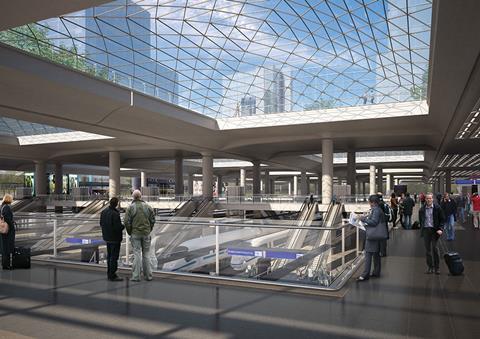What does the Labour PartyŌĆÖs ambivalence towards HS2 mean for those looking to work on the ┬Ż43bn project?

For one reason or another - most of them negative - the HS2 rail project has been hitting the headlines on a near daily basis for the past six months. Whether itŌĆÖs the governmentŌĆÖs promises of economic development miracles or critics picking holes in the scheme, HS2 has risen steadily up the news agenda.
However, it is the Labour partyŌĆÖs pronouncements on the project that should be of most concern to the construction industry. Following the news in June that the cost of the scheme had risen by about ┬Ż10bn to ┬Ż42.6bn (including ┬Ż14.4bn of contingency funding), first former business secretary Lord Mandelson and then former chancellor Alistair Darling raised concerns about the scheme.
Soon after, at the Labour conference in September, shadow chancellor Ed Balls said there was ŌĆ£no blank chequeŌĆØ for HS2 should Labour win the general election in 2015. Since then nobody in the shadow cabinet, not the transport spokesperson nor the Labour leader Ed Miliband, has been willing to commit the party unequivocally to the project.
All of which has frustrated the coalition - because of the long-term nature of the project, it is only viable if it enjoys cross-party support - and this led prime minister David Cameron to tell the CBIŌĆÖs annual conference this week that Labour was ŌĆ£putting our countryŌĆÖs future at riskŌĆØ. He announced that incoming HS2 chair David Higgins would ŌĆ£make absolutely sure we drive every extra bit of cost out of this that we can, so it comes in under the budget that has been setŌĆØ.
But just how damaging is LabourŌĆÖs ambiguity about HS2 to the projectŌĆÖs progress? And how seriously should we take the possibility that the party might decide to withdraw its support entirely? It was Labour, after all, that launched the project in the first place under then transport secretary Lord Adonis.
Critical stage
So far as the Department for Transport (DfT) is concerned, LabourŌĆÖs wavering means little in the short and medium term. A spokesman said that the main HS2 bill will go before the House of Commons later this year, with a second reading expected in spring 2014, and that construction on phase one of the project - from London to Birmingham - should begin in 2017, provided that royal assent is secured in 2015. ŌĆ£WeŌĆÖre progressing to that timetable and that timetable is unaffected [by LabourŌĆÖs intervention],ŌĆØ he said. ŌĆ£All the activity that we were expecting to do is continuing. ItŌĆÖs full steam ahead.ŌĆØ Meanwhile, HS2 Ltd itself has been outlining the opportunities on the project to contractors this week.
But the chance that Labour might withdraw its support for the project has people worried, especially as there is no guarantee that HS2ŌĆÖs ┬Ż43bn budget would be spent on other in construction projects, if it was cancelled. The party has pledged that it will state its position unambiguously by spring next year, presumably before the bill receives its second reading in the Commons. And it is that milestone in HS2ŌĆÖs progress that brings the greatest concern.
ŌĆ£ThatŌĆÖs a critical stage and if Labour by then has made the decision that it would rather not spend the money on this - goodness knows what reasons it would come up with to explain that position - then that would be pretty disastrous,ŌĆØ says Jim Steer, director of high-speed rail research body Green Gauge 21 and founder of transport consultancy Steer Davies Gleave, which is engaged on HS2. ŌĆ£At that point all the work would come to a grinding halt, with I have to say nobody having a clue about what we would do instead.ŌĆØ

Discouraging investment
It is also clear from talking to some of the construction firms already engaged on HS2 - at this stage exclusively consultants - that LabourŌĆÖs doubts about the project are already having a negative impact. After all, for a firm to put itself in a position to win contracts on the project, it has to invest - in talent, for instance - and if it looks likely that a future government would cancel a project then that investment becomes more of a risk than an opportunity.
ŌĆ£If you look at a project like HS2, weŌĆÖre talking about a large amount of work over a long period and we have to invest in that,ŌĆØ says Paul Dyson, a director in consultancy AecomŌĆÖs infrastructure team. ŌĆ£If thereŌĆÖs any likelihood that itŌĆÖs going to fall over after the election, people are going to start to temper their investment decisions. And thatŌĆÖs then a problem for HS2 if it does go ahead. If the supply chain hasnŌĆÖt prepared properly, then you wonŌĆÖt get the same immediate efficiencies.ŌĆØ
He adds that the uncertainty has implications for the team trying to deliver HS2. ŌĆ£HS2 Ltd is staffing up and looking to recruit the best people,ŌĆØ he says. ŌĆ£Are they going to be able to do that if people are unsure about the projectŌĆÖs future? [After all], there are a lot of opportunities in the Middle East and further afield.ŌĆØ
So the impact of LabourŌĆÖs equivocation is already being felt, something that Tory ministers have been keen to emphasise, accusing Balls, Miliband and others of playing politics with a project that is vital to UK industry. However, playing politics with HS2 is a charge that can be thrown back at the Tories.
In the run-up to the 2010 elections, Lord Adonis was secretary of state for transport for Labour and he offered to show the route, in confidence, to the ConservativesŌĆÖ and Lib DemsŌĆÖ transport advisers, both of who were in support of HS2. While the Lib Dems agreed, the Conservatives said that they didnŌĆÖt want to see it.
Steer says: ŌĆ£So in other words the Conservatives didnŌĆÖt want to be accused going into the election of having seen the route ahead of the public launch. They didnŌĆÖt want to be tainted by it.ŌĆØ
Talking tough
But would Labour really turn its back on HS2? For a definitive answer we will have to wait for the spring, of course, but some in the industry certainly consider it a possibility. After all, such a move would at a single stroke give the shadow chancellor billions of pounds to play with, allowing him to make other spending promises in the run-up to May 2015.
Withdrawing support would also place the Tories in an unenviable position of being the main backers of a project, the most vocal opponents of which live in Conservative constituencies. However, many in the industry with close ties to HS2 believe that Labour will ultimately back the project, arguing that BallsŌĆÖ position has more to do with being seen to take a tough stance on public spending than with increasing doubts about the projectŌĆÖs strategic importance. Labour - and Balls in particular - has an electoral problem when it comes to fiscal responsibility, they argue, and if the party can be seen to have put pressure on the coalition to deliver HS2 for a lower cost, so much the better.
Such views chime well with recent developments. Last week the Guardian reported that Miliband would throw his weight behind HS2 if David Higgins, incoming chairman of HS2 Ltd, succeeded in cutting back the projectŌĆÖs ┬Ż14bn contingency fund. The story followed a meeting between Higgins, Balls and Adonis on 15 October.
ŌĆ£My view is that itŌĆÖs going to happen,ŌĆØ says Mark Cowlard, head of transport at EC Harris. ŌĆ£Hopefully by spring 2015 it will get royal assent and then it will be heads cracking on with delivery. It will be about how we deliver efficiently rather than whether we should do it.ŌĆØ
Cowlard may well be right, but fears over Labour abandoning HS2 will only go away once its position is clarified next year. Seldom has a party of opposition held such power over the future of the industry.
WhatŌĆÖs at stake?
In total, HS2ŌĆÖs backers say that the project will lead to:
┬Ż19.6▓·▓į of construction work overall, including: ┬Ż3.8bn in tunnelling; ┬Ż7.7bn in civil engineering; ┬Ż4bn in building stations, depots and stabling; and ┬Ż4.1bn in railway systems
24,600 full-time equivalent jobs in construction
┬Ż1.70 for each pound spent in wider economic benefits on the first phase from London to Birmingham
┬Ż2.30 for each pound spent in wider economic benefits from the project as a whole
WhatŌĆÖs been spent already?
Total spending so far: ┬Ż247,525,987
Total spend on firms that have won places on HS2 LtdŌĆÖs construction frameworks: ┬Ż170,595,111
Which firms on the frameworks have received what?
Arup/Ove Arup and Partners ┬Ż60,318,758
Atkins ┬Ż29,574,583
Capita Symonds Ltd ┬Ż15,732,569
CH2M Hill UK ┬Ż21,137,510
KPMG LLP ┬Ż1,747,467
Mott Macdonald ┬Ż23,268,390
Mouchel Limited ┬Ż1,033,583
Parsons Brinckerhoff Ltd ┬Ż10,383,507
RSK Business Solutions ┬Ż2,921
RSM Leisure ┬Ż1,000
Temple ┬Ż6,032,977
TerraQuest ┬Ż1,361,847
All figures are based on monthly figures released by the Department for Transport covering all payments to external firms providing services to HS2 Ltd. The figures go back to April 2009, three months after HS2 Ltd was established, and do not include staff costs at HS2 Ltd.
What are the alternatives?
In the highly charged debate surrounding HS2, many have argued that upgrades to existing lines would be a preferable alternative, supplying the extra capacity required without the need for a new line slicing through the countryside.
Mindful of this, the government commissioned Network Rail and multi-disciplinary consultancy Atkins to prepare reports looking at the potential impact upgrading the existing east coast mainline, midland mainline and west coast mainline would have in terms of delivery and capacity.
The reports, which were published at the end of October, found the works would result in 2,770 weekend closures if capacity were to be brought up to the level HS2 is expected to achieve.
It says: ŌĆ£While some works could be programmed to coincide in terms of network downtime, this scale of work on the existing network would entail 14 years of weekend closures to allow the necessary upgrade works to be carried out. With work on multiple (parallel) routes, the scope to use adjacent main lines for diversionary routes is also diminished.ŌĆØ
The reports said that journey times would increase substantially, potentially doubling at times on some routes, and that upgrade works would still in all likelihood result in some properties being torn down.



























No comments yet